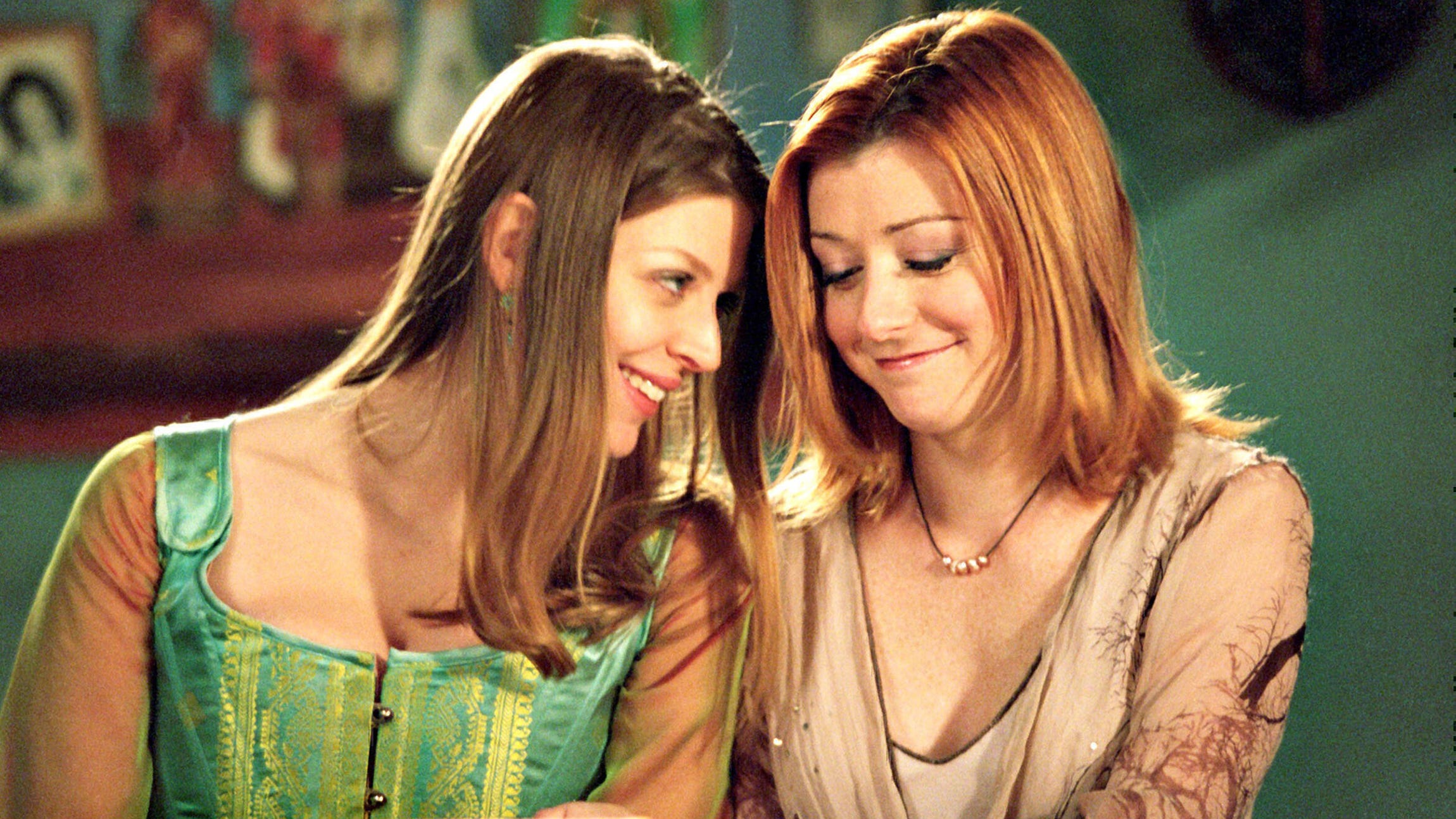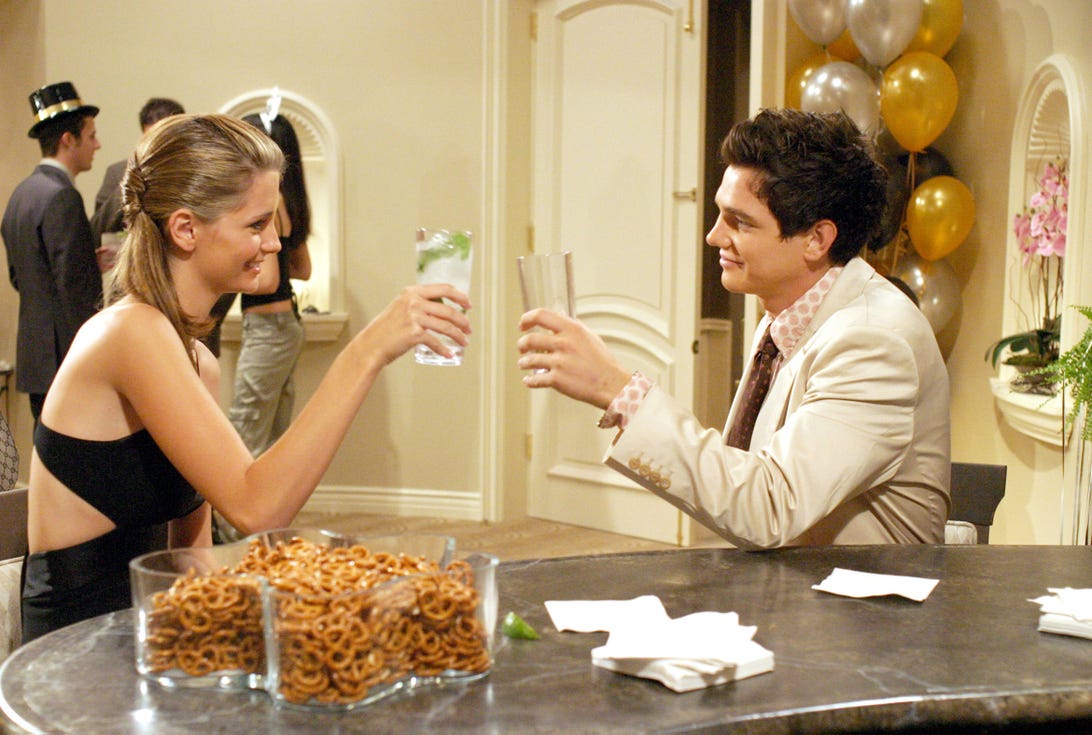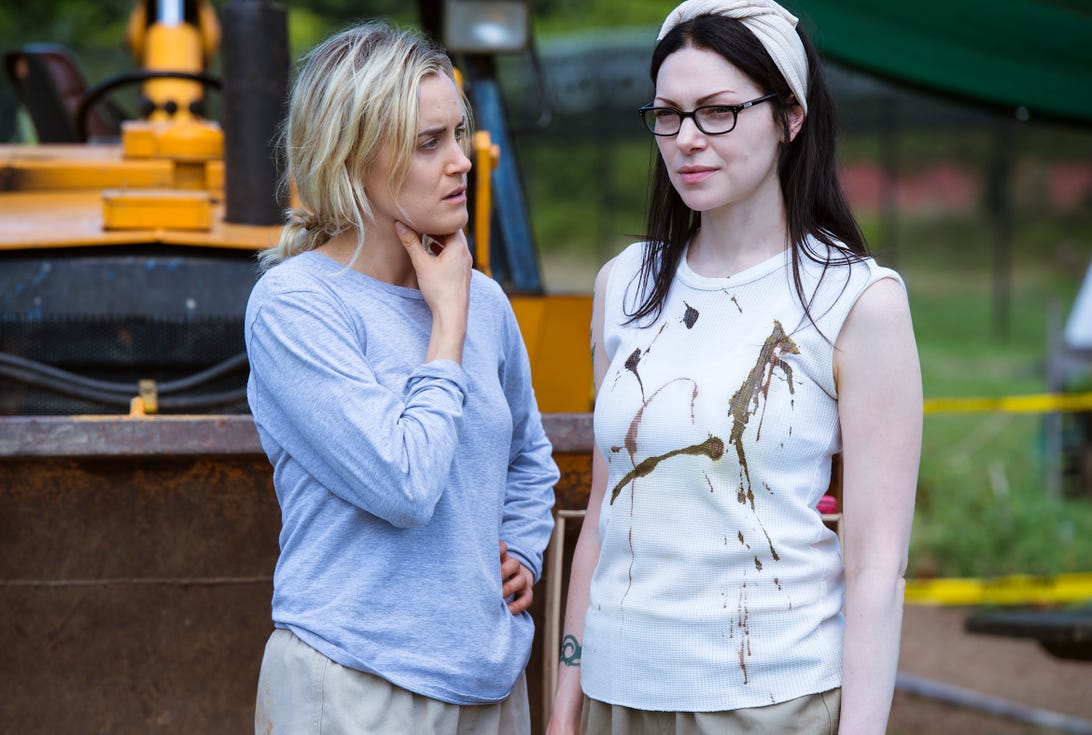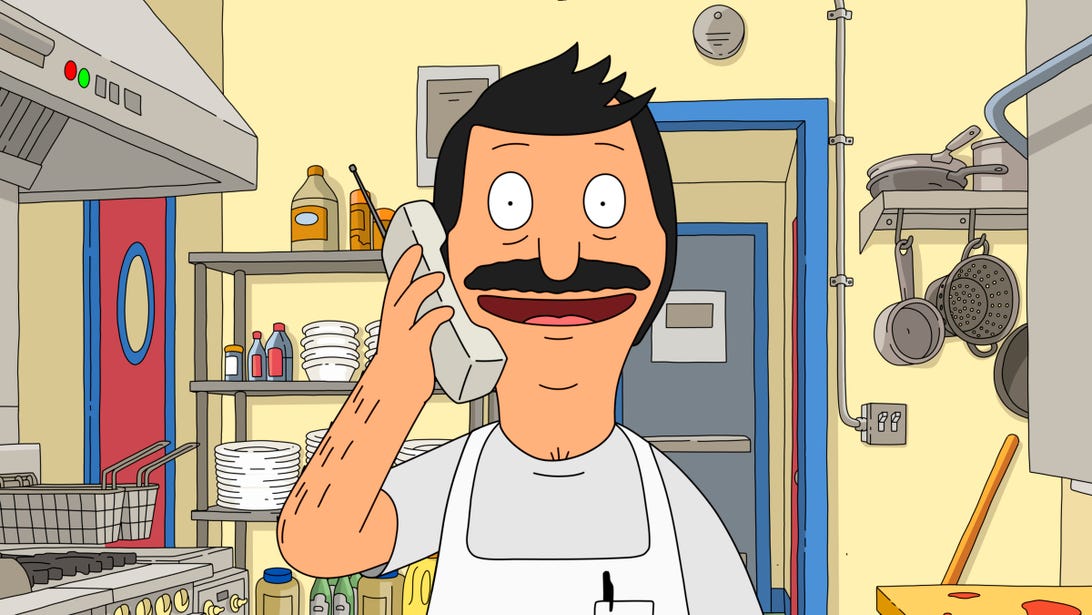
A Timeline of Unlearning Shame: A Bisexual Evolution
One woman's journey to acceptance, and how TV gave her a blueprint to navigate her identity.
One woman walks us through the confusing and misleading versions of bisexuality that she learned from TV, and how they ultimately led her to a place where she began to get comfortable in her own identity. While the author is out in her day-to-day life, she remains anonymous in the piece to avoid backlash from her family and community.
2000
Many queer women my age remember Willow and Tara's relationship on Buffy the Vampire Slayer as a turning point in their own lives. It's hard for me to cherish the show that way, because in 2000, the year Alyson Hannigan's doe-eyed character chose Amber Benson's witch over Seth Green's nerdy werewolf, Buffy the Vampire Slayer was already high on my list of things that made my parents uncomfortable--by extension, as a ten-year-old girl, it made me uncomfortable too.
I had a lot of questions about Willow but I had no one to ask. In fact, Joss Whedon's occult dramedy never really ventured an answer at all. Why, for instance, had Willow dated Oz if she had been a lesbian all along? When did she know she was a lesbian? Did feeling attracted to girls completely eclipse feeling attracted to men? Did she have to turn anything in the day she stopped being straight, like a straight ID card, or her ticket to heaven, or...
Alyson Hannigan confused me too; she had starred in American Pie a year before her lesbian storyline on Buffy began, and in that strange way children do, I had internalized the line "I stuck a flute in my pussy" without the necessary context. It looped in my brain like a demented riddle: woman says something profane with an innocent expression, man seems excited, audience laughs. Why, then, did my friend not laugh when I told her I liked watching girls put on lip gloss as much as I liked when a boy's t-shirt rode up as he whipped off his hoodie? Wasn't that supposed to be funny?

2005
By 15, I was more familiar with the equation (woman + wanting = comedy), but only in the sense that becoming familiar with a toxic smell dulls your awareness of it. That year, The O.C. wrote its female lead, Marissa (Mischa Barton), into a brief courtship with woman. Orchestrated for a ratings bump, the stunt was meant to be temporary and flashy. The relationship ended in Marissa's female fling losing her mind with jealousy, violently threatening people and throwing beer around. And just like any other sexual woman on TV, she was funny to the boys in my middle school classes, in the way a dog looks funny when it wants human food.
"The chick on The O.C. is a lesbian now. Have you seen it?"
A girl tried out for the football team at my school that year, and she started telling people she was bisexual, a term that my peers and the TV we watched deemed delusional, even dangerous. I remember watching her on the field, feeling both frightened and excited by the way her body was shaped differently than mine. She had muscle where I had baby-fat. The bisexual women I knew from TV looked like salt and pepper shakers; they only came in femme pairs that met in the middle, like me kissing my reflection.
2007
By 17, I had kissed a girl and a boy, separately, with all the passionate interest of a clinical lab technician. Neither one stuck. I was bored. It would have been alarming enough to my female, straight friends if I had admitted that losing my virginity felt anticlimactic (literally), so I told them a series of lies. That same year, A Shot of Love with Tila Tequila became the first--and still sole example--of a bisexual dating show. Tila herself was the lone bisexual character, choosing between a line-up of ultra-femme lesbians and chiseled straight dudes, both groups avoiding each other like ships in the night. I surmised from what I heard at school about Tila Tequila, who had been a Maxim and Playboy centerfold, that to feel romantic and sexual feelings for men and women was obscene. I was a pervert, I concluded, starting my high school's first LGBT alliance under the guise of simply being an ally to my gay male friends in the theater program. From A Shot at Love, I assumed that I wanted a kind of 3am love story, one that might run between ads for Girls Gone Wild.

2012
I attended a women's college and figured out a great deal away from the blue light of a television. My friends knew all about my crushes on men, and they had met my high school boyfriend, but the fact that I'm not a lesbian made coming out feel frivolous to me somehow, like I had been half-lying to them. I only had to come clean about the half of me I hid, I thought. Still, there was no one like me on TV, a femme-leaning woman whose "type" was based more on acerbic humor than gender. Coming out to anyone still felt gross, as if I were hitting on them; the vast majority of bisexual characters I had seen on TV were oversexed, salacious, and unstable. I didn't have any signposts to help navigate a path many people breeze through in college.
But a year after I graduated college, I watched the first bisexual heroine I could remember navigate two love affairs, one with a witty, caring man and a witty, selfish woman. Taylor Schilling as Piper on Orange is the New Black eventually took a backseat to rightfully cede the screen to her co-stars, comprised of women of color and women with an array of body types and gender presentations, but for me, she was something special. Her attraction to one man didn't eclipse or negate her attraction to one woman, and she was capable of commitment to a partner despite her sexuality being vast and full of tiny, twinkling contradictions. Of course, she cheated, but that was a product of her other character weaknesses, and no one seemed to blame it on her bisexuality.
2018
Now I'm staring down 30, writing for the first time about my bisexuality despite working as a professional writer for a decade. I'm in a happy relationship with the first person I've ever bothered to explain my bisexuality to, and I am fixated on characters like Crazy Ex-Girlfriend's Darryl (Pete Gardner), Bob's Burgers' Bob (H. Jon Benjamin),Jane the Virgin's Petra Solano (Yael Grobglas) and Brooklyn 99's Rosa (Stephanie Beatriz), each a functional adult who is no longer figuring things out. Bisexuality isn't the most entertaining or compelling part of their characterization, and yet each would seem less complete without it.
I'd like to say that I most identify with gorgeous, dry-humored Rosa, who tells her friends and coworkers explicitly, "I'm bi." I'd even love to be a Petra, who falls so hard for each partner, regardless of their gender, that there's no confusing her open sexuality for an aversion to commitment. The truth is, I am most like Bob Belcher, enamored with and exhausted by my life and all its weird happenings, cognizant that I could have chosen a more militantly queer existence rather than tangentially flirting with joining a queer community. You are not like us, even the most queer-friendly TV told me for decades. The stories about straight people, told ad nauseum, have told me the same.

I am, as Bob tells the deli guy he clearly has a crush on, "not completely straight." That's the most comfortable way I can word it, because pop culture taught me a long time ago that "bisexual" is a nonsense word. When it comes to representation, my tiny thread in the LGBT rainbow keeps slipping down America's list of priorities. Maybe no TV writers wanted to shoulder the burden of a character whose sexuality strikes so many people as incomplete and ready to explode--but hey, at least stories about people like me are beginning to appear in prime-time.
I still struggle quietly as a viewer of both "mainstream" and queer-friendly TV, as shows that feature gay characters don't discuss bisexuality as freely as they do the preferences of characters who "just always knew" who they were. I hold onto fleeting lines, like Kameron Michaels mentioning that he's had sex with women and men on RuPaul's Drag Race Season 10, or Antoni on Queer Eye joking, "I haven't done a woman in years." It can feel like bisexuality is either the subject of a "very special episode," written with all the delicate pussyfooting of an after-school special, or else it's immediately dismissed as a phase. Maybe in another decade, TV writers will accept the bright challenge of allowing their characters to experience bisexuality as a static, unchanging, and fulfilling identity, one that doesn't exist to drive ratings or cause emotional distress.
Sometimes the tiny aggression sneaks up on you; while binging The Staircaseon Netflix, I inadvertently sucked air in through my teeth when it was revealed that defendant Michael Peterson identifies as bisexual. I predicted, correctly, that the prosecutor would use Peterson's sexual ambivalence as evidence of a dangerous inner conflict; by being neither straight nor gay, Peterson suddenly looked like a threat or a changeling, enjoying affection and emotional support and sex with his wife but, of course, cheating on her to fulfill some carnal need that monogamy apparently couldn't satisfy. I resent that characterization of bisexual people as much as I resent "it's just a phase." Maybe that's me getting older; I've been this way as long as I can remember, and yet most TV would tell you I'm kidding myself.
